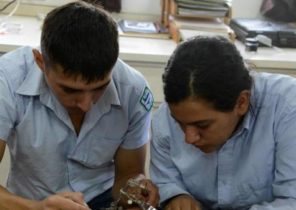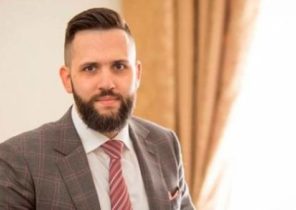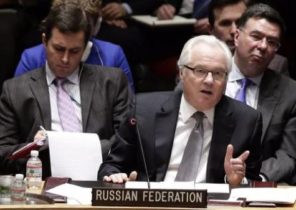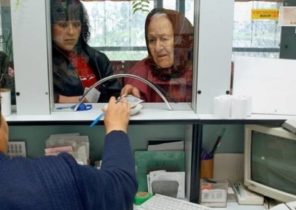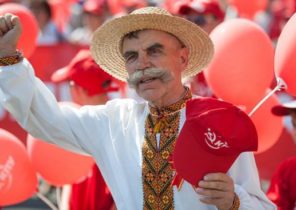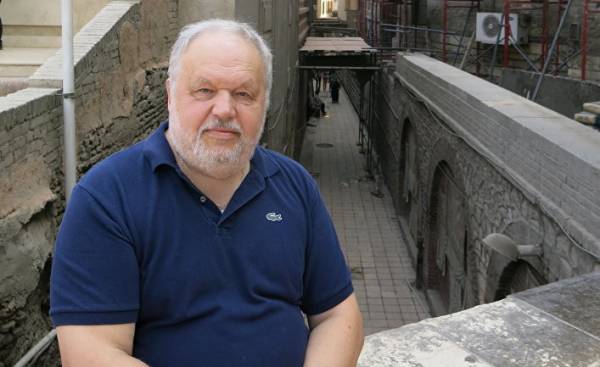
In Germany, a discussion around the recent statements on the Crimea made by the leader of the Free democratic party (FDP) Christian Lindner. In an interview with the largest regional newspaper Westdeutsche Allgemeine Zeitung (WAZ Lindner was asked to give a new start to relations with Russia — despite the “Crimean question”, which decision must be postponed indefinitely (dauerhaftes Provisorium). If the “decapsulate” the Crimean question, then, according to Lindner, Europe and Russia will be able to make progress in other areas.
In addition, according to Lindner, it is necessary to give to Vladimir Putin the opportunity to “save face” to resolve the conflict in the East of Ukraine. That is especially important, Lindner urged the EU to link the abolition of anti-Russian sanctions with the implementation of the Minsk agreements, and to remove restrictions on the implementation of the “intermediate steps”. It is, according to German policy, a return to Realpolitik “Realpolitik” towards Russia, begun by Willy Brandt.
Lindner’s statement caused a wave of criticism in the German press, his proposal was immediately rejected by the government of Angela Merkel. Lindner was accused of violating Western solidarity, the promotion of the interests of economic lobbies, etc. the Special discontent caused “attempt to break the unity of the sanctions policy of the West.” At the same time, Lindner was supported by Sahra wagenknecht, one of the leaders of the Left party of Germany. According to her, it is necessary to revive the policy of good neighborliness in relations with Russia. If the FDP will resume this tradition, it will, according to Wagenknecht, an extremely positive fact. Peace in Europe is only possible with Russia, not against Russia.
Few weeks in Germany elections to the Bundestag, and each statement of politicians is of particular importance. Moreover, the leader of the free Democrats Christian Lindner is known that very carefully selects the expression. Lindner is a young politician, he was 38 years old, and he represents a generation that emerged after the cold war. It is notable for pragmatism and balanced approach to geopolitical problems. Many observers believe that the statements Lindner is a clever pre-election move.
A small but highly influential party “free Democrats” (she was included in many post-war German government) has always been more flexible than their partners and is largely determined by the policy of “large coalitions”. So, its long time leader and Minister of foreign Affairs of Germany Hans-Dietrich Genscher was one of the main initiators of a rapprochement with the Soviet Union. When in 1987 he declared a policy of open dialogue with Moscow, euroatlantische accused him of “violation of taboo”. However, this was followed by the most significant breakthrough in bilateral relations. And now, notes a number of German analysts, Lindner takes over from the deceased last year Genscher, giving to understand that the strategy of the Americans on driving a wedge between the EU and Russia are doomed to failure.
The FDP as the party of business understand that Germany cannot live with permanent ballast in relations with Russia, and therefore, the Crimean issue should be removed from the agenda, or at least indefinitely “frozen.” From relations with Moscow, says Lindner, depend on the security and prosperity of Europe.
Observers have concluded that Lindner made his. His statement produced a bombshell he violated the established anti-Russian consensus, and now his proposal in the Crimea will not leave the political agenda. Indeed, the leader of “free Democrats” expressed the position of those who adhere to traditional Ostpolitik since Willy Brandt. For them, the strengthening of economic ties with Russia is a priority.
A chorus of such voices in Germany and Europe multiplied. The Bavarian Christian social Union, the ruling party of Austria, the leading political forces of Italy and many others increasingly call for the abolition of anti-Russian sanctions and the adjustment of the Eastern policy. Realistically-minded politicians in Germany and Europe it is obvious that Russia will never give Crimea, and to raise this issue is simply useless. German business is looking forward to when he will be able to resume full trade and economic relations with Russia. Moreover, growing dissatisfaction with the American pressure on the joint Russian-German projects in the energy field. There is no doubt that the Pro-Russian statements will be more in Western Europe.
It should be noted that the statement on Crimea was made by the leader of the party, which very likely will become a partner of the Christian Democrats in a new coalition government after the elections on 24 September. Young, photogenic (it is called the “Makron room 2” and a rising star of German politics), Lindner dared to Express what he thinks is not only the main part of the German business community, but the political class as a whole.
Statements of Lindner immediately raised the rating of the FDP, which for several years was in a state of decline, and increased its chances of joining the “Grand coalition”. According to the latest projections, the Alliance of Christian Democrats and liberals is very likely, and Lindner can count on a high post in the new government.
Forecasts ahead of the September elections to the Bundestag the following picture show: demokratiska coalition of the CDU/CSU led by Angela Merkel, gaining about 40%, Social democratic party — about 25%, the Left party 9%, the right-wing “Alternative for Germany” — 7% (on the verge of passing score) and the FDP — 9%, which allows the party enter the Bundestag. This means that demochristian coalition with the liberals is very likely, and Lindner as the leader of the FDP may get the post of Minister of foreign Affairs, as has repeatedly occurred in the history of Germany.
